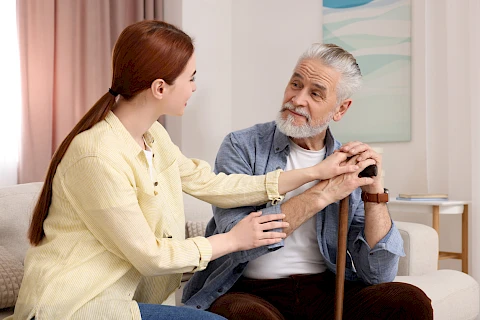
Risk Awareness Week is a reminder to focus on the safety and well-being of the seniors in your care. During this week, we highlight the common risks that seniors face and explore strategies to minimize these dangers. For family members caring for senior loved ones, understanding these risks and knowing how to address them can make a big difference. We want to discuss common risks such as falls, medication errors, and social isolation and offer practical tips for ensuring your loved ones maintain a high quality of life.
Falls
Falls are one of the most significant risks for seniors. According to the Centers for Disease Control and Prevention (CDC), one in four adults aged 65 and older falls each year. The impact of falls can be serious, leading to injuries such as hip fractures and head traumas. Various factors like poor vision, balance problems, and home hazards contribute to the likelihood of falls.
Preventing Falls
Making a few changes around the home can go a long way in preventing falls. Consider installing grab bars in bathrooms, using non-slip mats, and ensuring good lighting in all areas of the house. Encourage seniors to engage in physical activities like walking or balance exercises to strengthen muscles and improve balance. Additionally, routine eye exams and check-ups should be scheduled to identify and address any vision or health issues that might increase the risk of falling.
Medication Errors
Medication errors are another prevalent issue. With age, many seniors take multiple medications, increasing the risk of mistakes. The consequences of taking the wrong medication or incorrect dosage can be severe, ranging from mild side effects to hospitalization. Common mistakes include forgetting to take medication, confusing dosages, or mixing up different prescriptions.
Avoiding Medication Errors
Proper medication management is crucial to preventing errors. Use pill organizers to arrange medications by day and time, making it easier to keep track of what to take and when. Utilize smartphone apps or automated pill dispensers that provide reminders to take medications. Regularly review all medications with healthcare providers to ensure they are all necessary and to understand how to take each one correctly.
Social Isolation
Social isolation is an often overlooked but critical risk. Being socially isolated can have both emotional and physical consequences. Seniors may experience depression, anxiety, and other mental health issues. It can also lead to physical health problems like high blood pressure and weakened immune systems. Reasons for social isolation include limited mobility, loss of friends or family, and living alone.
Combating Social Isolation
To address social isolation, encourage seniors to stay connected and active. Promote participation in local events, clubs, or group activities to meet new people and stay engaged. Look for programs offered by community centers or senior facilities that provide opportunities for social interaction. Make regular phone calls, arrange video chats, or plan visits to help maintain strong family bonds.
Ensure Senior Safety and Wellness Today
Risk Awareness Week is a time to focus on the safety and well-being of the seniors in our lives. By understanding the common risks they face, such as falls, medication errors, and social isolation, we can take proactive measures to minimize these dangers. Implementing the tips provided here can help ensure your loved ones lead a safer, healthier life.
Take action today to promote the well-being of your senior family members. Contact Senior Helpers Harrisburg for professional assistance in Harrisburg, Camp Hill, Mechanicsburg, Palmyra, and Dauphin County. Our team is dedicated to helping you ensure the safety and happiness of your loved ones.